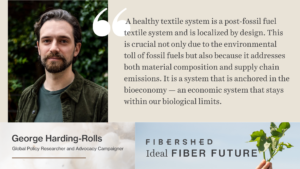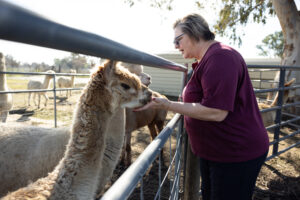Scaling Climate Beneficial Agriculture
Building New, Accessible, and Equitable Market Opportunities for Climate-Smart Cotton and Wool
As part of a USDA Climate Smart Commodities grant project, we have partnered with five organizations—The National Center for Appropriate Technology (NCAT), Seed2Shirt, Colorado State University, Carbon Cycle Institute, and New York Textile Lab—to scale the Climate Beneficial™ fiber program in five regions across the country, with the ultimate goal of expanding nationwide.
The Climate Beneficial Program is a market proven system for regenerating soil health, drawing down carbon, and improving social equity, while producing high quality regional and domestic fiber and textiles. We are developing this program in collaboration with cotton and wool producers across the country, technical assistance providers, scientists, researchers, and brands in order to strengthen regional economies around climate smart fiber production.
This starts with building regional capacity for technical assistance, Carbon Farm Planning, and direct financial support for land stewardship. A newly created, open-source Carbon Farm Planning and Verification Platform will streamline climate-smart agriculture planning and verification for producers, verifiers, and supply chain stakeholders.
We are working with wool growers in Northern California and the Northern Great Plains (Montana, Wyoming, South Dakota), and cotton growers in the San Joaquin Valley and Southeast Cotton Belt (North Carolina, Georgia, Tennessee, and Indiana), with particular support offered to Black cotton farmers in the Southeast.
Our project goals and objectives for scaling this work are as follows:
GOAL 1: Implement climate-smart production practices, activities and systems on working lands
1.1 Accelerate adoption of climate-smart agricultural (CSA) practices among wool and cotton fiber producers.
1.2 Improved efficiency, productivity, and sustainability of underserved and small producers.
1.3 Nationwide scalability for Carbon Farm Planning and the Fibershed Climate Beneficial Fiber certification and verification program.
GOAL 2: Measure/quantify, monitor and verify the GHG benefits associated with those practices
2.1 Improve on-the-ground technical capacity for planning, monitoring, and verification of greenhouse gas (GHG) and non-GHG benefits associated with Carbon Farm Plan implementation.
2.2 Accurately quantify the amount and longevity of GHG benefits of CSA practices implemented.
2.3 Accurately quantify non-GHG benefits of CSA practices.
GOAL 3: Develop markets and promote resulting climate smart commodities
3.1 Establish market-driven incentivization of commodity fibers grown using CSA practices.
3.2 Pilot a robust, full life-cycle system that ensures climate beneficial fiber producers receive enhanced market value.
If you are located in one of our target regions and are interested in joining this work, get in touch!




